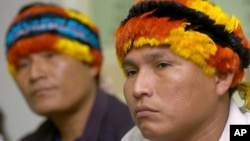An indigenous federation opposed to a recently approved plan for oil drilling in the Peruvian Amazon said on Friday that native communities will physically block any attempt by oil companies to operate on their lands.
Last week the Peruvian government gave the green light for Santiago-based GeoPark Ltd. to produce oil in Block 64 with state-owned energy company Petroperu as its junior partner. The move is part of President Pedro Pablo Kuczynski's bid to “untangle” stalled investments from red tape.
But Jeremias Petsein, president of the indigenous federation FENAP, said the chiefs of 45 Achuar communities that live in Block 64 are all opposed to oil drilling and plan to block the companies from setting foot on their lands.
Block 64 has about 40 million barrels of oil in proven and probable reserves. GeoPark and Petroperu struck a partnership to develop it two years ago, but the previous government did not issue approval amid concerns about Petroperu returning to oil production after more than two decades.
The Achuar's ancestral lands cover about two-thirds of oil Block 64, though most communities lack formal land titles, said Petsein.
"We have healthy rainforest free of pollution; that's why we don't want oil companies to come in," Petsein said. Oil pollution "is a reality in other indigenous communities, it makes people sick and destroys our way of life."
The Achuar are asking local courts to annul the 1995 creation of Block 64, as well as last week's approval of GeoPark's plans for operating there. FENAP attorney Raquel Yrigoyen said both measures were illegal because the government did not consult the Achuar as required by laws protecting indigenous rights.
The government did not respond to requests for comment.
GeoPark said the focus of its project in Block 64 is between the Situche and Anaso creeks, where Shuar and Achuar native communities that are not affiliated with FENAP have supported oil exploration.
"GeoPark respects the rights of indigenous people and would not seek to develop areas where local populations are opposed to drilling activity," the company said in a statement.
Peru is one of the region's fastest-growing economies. But it is rife with disputes over natural resources that have derailed billions in investments and left more than a dozen dead in clashes with police in recent years.
Petroperu, which mainly transports and refines oil, has reported a dozen leaks in its Amazonian pipeline this year — a source of tension with native communities.





